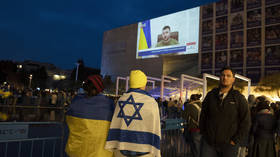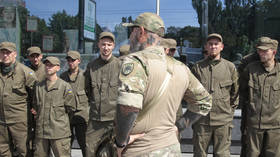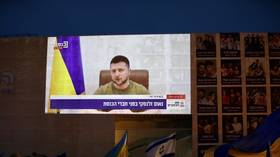Arab parliamentarians skip Zelensky’s Knesset address

Both Arab parties in the Israeli parliament, the Knesset, skipped a video address by Ukrainian President Volodymyr Zelensky, with one of them saying the conflict between Moscow and Kiev was wrongly portrayed in the Western media.
Only one out of 10 Arab lawmakers joined the Zoom conference with Zelensky on Sunday. This was Walid Taha from the Ra’am (United Arab List) party, which is part of Israel’s ruling coalition. Ra’am leader Mansour Abbas snubbed the event as he was addressing a conference in the city of Haifa at the time.
The opposition Joint List, which unites four Arab parties and holds six seats in the parliament, boycotted the Ukrainian president’s speech altogether.
The move was announced beforehand by the left Hadash party, which leads the alliance. Its only Jewish member, Ofer Kassif, explained on Saturday that “unlike the claims we hear in the Western media, and also hear day and night, that this war is like war of the Sons of Light against the Sons of Darkness... but it isn’t.”
“For years, there were crimes against the Russian minority in Ukraine,” Kassif said, apparently referring to up to 14,000 people killed in Kiev’s attacks on the breakaway republics in Donbass since 2014 and the clampdown on the use of the Russian language by the Ukrainian authorities.
“In Ukraine, the regime shamelessly works hand in hand with neo-Nazi militias such as Azov. This is the truth. There is no Sons of Light against the Sons of Darkness here,” the lawmaker pointed out.
However, Kassif said he was still against the Russian military operation in Ukraine and urged Moscow to swiftly withdraw its forces from the neighboring country.
“Our position is that NATO and its leader America imposed this war,” a spokesman for the Joint List and HadAsh chief Mansour Dahamsheh told the Times of Israel on Sunday.
One of Moscow’s demands during the ongoing peace talks with Kiev is for Ukraine to declare itself a neutral country, so it cannot become part of NATO’s eastward expansion, which Russia sees as a major threat to its national security.
During his speech, Zelensky, who is Jewish, shamed Israel for not doing enough to help Kiev during the conflict and for refraining from sanctioning Russia. He insisted that the Jewish state should send air defense systems and other weaponry, while also comparing the events in Ukraine to the Holocaust.
The latter point angered many Jewish parliamentarians, who accused the Ukrainian leader of distorting history and attempting “to erase the involvement of the Ukrainian people in the extermination of Jews.” The statement by Zelensky “borders on Holocaust denial,” Yuval Steinitz of the Likud party insisted.
The Israeli government was less emotional, with Foreign Minister Yair Lapid thanking Zelensky for “sharing his feelings and the distress of the Ukrainian people” with the Knesset. “We will continue to provide assistance to the Ukrainian people in any way that we can,” he stated.
Moscow sent its troops into Ukraine in late February, following a seven-year standoff over Kiev’s failure to implement the terms of the Minsk agreements, and Russia’s eventual recognition of the Donbass republics with capitals in Donetsk and Lugansk. The German- and French-brokered protocols had been designed to regularize the status of those regions within the Ukrainian state.
Russia has now demanded that Ukraine officially declare itself a neutral country that will never join the US-led NATO military bloc. Kiev insists the Russian offensive was completely unprovoked and has denied claims it was planning to retake the two republics by force.














